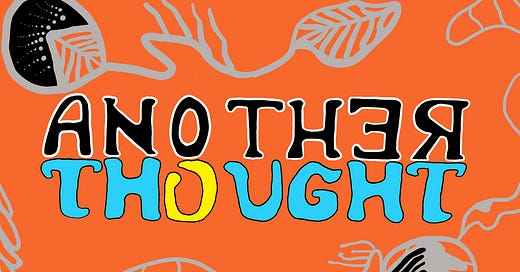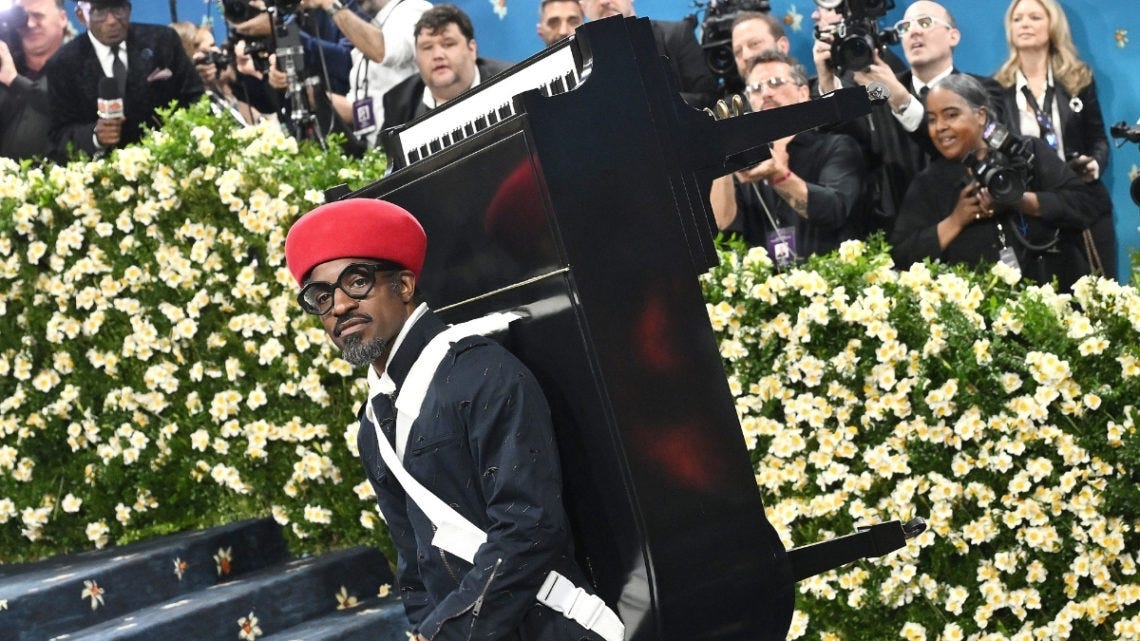Sufjan & Lowell: The Ambient Kinship of 'Aporia'
Revisiting the New Age Album that May Reframe ‘Carrie & Lowell’
It took me years to understand it. Sometimes even the art you feel called to—often for reasons you can’t explain—takes time to reveal itself.
I’ve had Aporia, the collaborative album by Sufjan Stevens and Lowell Brams, on my shelf for years, occasionally spinning it and always finding it pleasant. I bought the record on one of my first trips back to record stores post-pandemic. I wasn’t entirely sure why. Partly, I think it was because my wife is a huge Sufjan fan. But it’s a record quite unlike most of his work. It’s largely ambient—sprawling in nature and devoid of the delicate, lyric-driven songwriting he’s known for.
The other day, though, I found that orange cover calling to me. I thought I’d put it on just to have something playing in the background. But instead, I found myself captivated. The wondrous sounds of passages like “Disinheritance,” the triumphant swells of “Glorious You,” and the hypnotic pulse of “The Runaround” pulled me in (and surprised me when Sufjan’s vocals popped up so deep into the album).
As I started to read more about Aporia—for the first time since it came out—it all began to click. I realized I’d never given the album its proper due or tried to understand its story. And understanding its story has made me fall deeply in love with this record and what it means in the context of Sufjan’s music.
This year marks the 10th anniversary of Sufjan Stevens’ Carrie & Lowell. While it may sound hyperbolic, I believe Carrie & Lowell is one of the most vital modern works centered on grief—and arguably his greatest. The record is vulnerable in both its writing and performance, with some of Sufjan’s most pared-down recordings—shedding the ornate fanfare of early celebrated works like 2003’s Michigan and 2005’s Illinois, and far more conventional than his 2010 electronic-leaning opus The Age of Adz.
I also don’t want to understate how beautifully Carrie & Lowell is recorded. Sometimes a song calls for horns and cheerleader-like chanting, like those early albums did. But in this case, the songs mostly needed delicate fingerpicked guitars and a quiet voice to sing them. That heavy grief portrayed through soft, pretty instruments is a powerful pairing.
To understand Carrie & Lowell—and, as we’ll get to, Aporia—it’s important to know some of the story. Sufjan was born to his parents, Carrie and Rasjid. He was one of many siblings, but when he was just a year old, the couple divorced. Carrie left the family and did not maintain contact, leaving Sufjan and his siblings in a complicated household led by Rasjid in Michigan. In a 2015 interview with David Eggers for The Guardian in 2015, Sufjan recalled, “We were treated like tenants… It was a familial conglomerate mess.”
Eventually, Carrie remarried a man named Lowell Brams. They lived together in Eugene, Oregon. It was Lowell who urged her to reconnect with her children. She brought Sufjan and his siblings out to the West Coast, where they made memories of several magical summers. Lowell and Sufjan had apparently met before—when Sufjan was just one year old—but Lowell cheekily notes in interviews and album notes that “Sufjan doesn’t remember it.” They reconnected during those summer visits, and Lowell noticed Sufjan’s aptitude for music.
Music wasn’t allowed in Rasjid’s household, but with Lowell, Sufjan was able to discover records by The Beatles, Nick Drake, and even the Wipers.
Carrie and Lowell’s relationship didn’t last—they eventually divorced—but Sufjan and Lowell were fated to remain in each other’s lives. Lowell moved to Michigan. Even though he lived in the lower part of the state and the kids lived in the upper, he was able to visit often. As Sufjan began playing in bands, Lowell supported him however he could. He even gifted Sufjan his own keyboard—a KORG Poly-800—and a 4-track cassette recorder. In 1999, Sufjan recorded his first album, A Sun Came, as a senior project for his Pro Tools class. Eager to help, Lowell formed Asthmatic Kitty Records and pressed 1,000 copies of the album.
Interestingly, the track “Godzuki” features Sufjan and his siblings goofing around as kids and was recorded by Lowell in 1981, offering a brief glimpse into the world described on Carrie & Lowell.
Asthmatic Kitty—named after Lowell’s cat Sara, who did in fact have asthma—is still the home base for Sufjan’s music. The label has gone on to release records by Helado Negro, Julianna Barwick, Angelo De Augustine, and many others. Lowell managed the label for decades. He even released his own record, 2009’s Music for Insomnia, as part of the label’s Library Catalog Music Series, which focused on instrumental music. That record marked one of the first notable (or at least widely available) musical collaborations between Lowell and Sufjan, with Sufjan appearing on harmonium, keyboards, and a litany of other instruments.
As the 2020s approached, Lowell was ready to retire from the asthmatic record biz. But before departing, the two had one thing left to do: make a true album together.
Over the years, they had jammed and recorded between Sufjan’s grueling touring and writing schedule. They had hours of material—more than enough for multiple albums—but were unsure of the quality. These were explorations, not yet tight or focused enough for a proper release. With Lowell’s retirement on the horizon, it felt like the right time to revisit the material, find the best moments, and shape them into something cohesive. They looked to early electronic pioneers like Wendy Carlos and Raymond Scott, as well as soundtracks like Blade Runner and Hereditary.
As you might expect from those reference points, Aporia sounds quite different from Carrie & Lowell. But it’s not completely uncharted territory for Sufjan. There’s his wildly experimental 2001 album Enjoy Your Rabbit, as well as the bombastic beats of The Age of Adz. It’s also worth noting that in the years just before Carrie & Lowell, following his mother’s death in 2012, Sufjan found himself in a fiercely experimental period. He made a hip-hop album with the artist Serengeti and scored the ballet Everywhere We Go.
As he told Eggers in that Guardian interview: “I was trying to manipulate my mood. I was working the opposite of my own true interior envelope. I wasn’t able to admit how deeply I was affected by her death.”
All of these details help explain why I think Aporia is such an important album in Sufjan’s catalog. There’s something poetic about how, after fully facing his feelings head-on with Carrie & Lowell, he returned to experimenting—this time alongside Lowell. He wasn’t chasing new sounds to escape; he was working with someone who knew him best, who understood his grief, and who loved him. Even at its most spacey—when Aporia sounds like a spaceship splashing down into Solaris—there’s a warm sense of peace. He’s not alone on that ship. Lowell is right there with him.
I’m not going to try and convince you that Sufjan’s best album is an obscure ambient record he made with his stepdad. But I also don’t think albums need to be an artist’s best work to be meaningful. And I find Aporia deeply meaningful—for its approach and where it stands in Sufjan’s body of work.
After the brutal, beautiful grief of Carrie & Lowell, Aporia feels like a coda. Where one is a reflection on loss, the other is a meditation on the future. If you play Carrie & Lowell’s closing track, “Blue Bucket of Gold,” into Aporia’s opener, “Ouisa”… I’m not going to say they fade perfectly into each other, but as “Gold” fades out, “Ouisa” slides open like a new dawn. After the heaviness of Carrie & Lowell, there’s a beautiful comedown—a quiet celebration of new beginnings—in Aporia. A new phase in life for Lowell. A new phase in grief for Sufjan.
“Aporia,” as a term, references uncertainty, doubt, and contradiction. Fittingly, Aporia doesn’t offer answers. What do you do beyond grief? What do you do with your life after you’ve stopped doing the thing you’ve done for decades? That’s the beauty of ambient music—it isn’t about finding answers. It’s a mode for questioning and considering.
I find myself embracing Aporia more and more. Beyond all else, it succeeds as a fantastic ambient album. But the story and intention behind it elevate it beyond “nice sounds” into something deeply personal and profound.
The kinship between Sufjan and Lowell is a beautiful thing. That Lowell invested his love and intention into Sufjan—and that Sufjan took those gifts and returned them—is incredibly moving. In a heartbreaking world, tenderness like this goes a long way. And when you can do that while using divine synthesizers too… well, that really is just the best.
Stray Thoughts
LISTENING: André 3000 – 7 Piano Sketches
Last week, I wrote at length about André 3000 as a “cowboy artist” — someone always chasing new horizons. Well, he’s found yet another. From rap to flute, and now to piano.
I’ll be honest: when I first listened to this short record yesterday, I found myself making a snap judgment. I even messaged a friend to say I didn’t find it as compelling as his astounding flute odyssey New Blue Sun. That record grabbed me immediately and continues to be something I think about often and hold dear.
But as I was working on this week’s newsletter last night, I decided to give 7 Piano Sketches another shot. I often write at a neighborhood bar once a week, and on the walk home, I put the album on in my headphones. The sun had just set, and the streets were quieting down. As I walked in the dark, the piano musings blended with the scenery and the feeling of the night. Birds sang one last song from the trees before calling it quits for the evening. The mood of it all mirrored the listless energy of 3000’s exploratory tracks — and I started to get it.
To revisit a point I made in the Aporia essay: why do we always ask if one album is better than another? Why not be more curious about what an artist is trying to express from work to work — instead of asking, “Is this better than the last one?” I catch myself doing this all the time, constantly comparing art against other art. Ranking and listing have become such a big part of music culture, and I’ve had plenty of fun doing that with friends. But it’s something I’m questioning more and more. 7 Piano Sketches (and Aporia) are reminders to stay open and curious — not transactional — in my listening habits. I’m looking forward to spending more time with these short recordings.
Also, as an aside, the song titled “when you're a ant and you wake up in an awesome mood, about to drive your son to school, only to discover that you left the lights on in the car last night so your battery is drained” actually made me stop and double-check that I’d turned my own headlights off. He claims the album has no bars — but with titles like that, I beg to differ.
WATCHING: The Rehearsal (Season 2)
Look, I don’t know how to talk about this one. I’m not even sure I could sell it if I tried — and I think part of the experience is just going in blind and seeing what it is for yourself. Nathan Fielder remains, to me, one of the funniest and most brilliant people working today. The past two episodes have had me laughing to tears while also questioning the ethics of everything on screen. I’ll leave it at that and hope it tantalizes you.
Guest Artwork: Selection from Renowned Illustrator, A. Child
Our daughter is incredibly observant. She hears me talk about this newsletter, and occasionally sees me drawing pieces for it. She made these selections and explicitly asked if I could include them in “your newsletter, Dada.” And hey — it gives me a chance to dote and express (again and widely) how much I love her and how proud I am.
These drawings are space-themed. As I noted last week, she’s really into the Tunde Adebimpe song “Magnetic,” which opens with the line: “I was thinking about my time in space…” I believe that inspired these galactic scenes. She’s also informed me that the song is about the Pokémon Magneton — so keep that in mind next time you listen!
20th Century Ambient Coming in November
My upcoming book, 20th Century Ambient, is now available for pre-order! If you’ve been enjoying the blend of music deep dives and comics in Another Thought, I think you’ll really love this.
“Through text and comics, 20th Century Ambient searches through ambient music's recent history to unearth how the genre has evolved and the role it plays in our daily lives.”
It’s out November 13, 2025 from Bloomsbury Books. Don’t miss your chance to reserve a copy now.









The Rehearsal, Season 2, Episode 3 is the work of a mad genius. If you were concerned after the first two episodes about ethics, oh my...
Long-time Sufjan-superfan, but I'd never seen that video. Mesmerizing. Thanks for sharing. And if you're looking for cool piano music, I cannot recommend the new Phil Cook highly enough (playing Fremont Abbey 5/15).